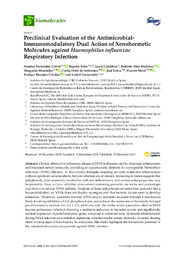Please use this identifier to cite or link to this item:
https://hdl.handle.net/11000/5894Full metadata record
| DC Field | Value | Language |
|---|---|---|
| dc.contributor.author | Fernández Calvet, Ariadna | - |
| dc.contributor.author | Euba, Begoña | - |
| dc.contributor.author | Caballero, Lucía | - |
| dc.contributor.author | Díez Martínez, Roberto | - |
| dc.contributor.author | Menéndez, Margarita | - |
| dc.contributor.author | Ortiz de Solórzano, Carlos | - |
| dc.contributor.author | Leiva, José | - |
| dc.contributor.author | Vicente Micol, Vicente | - |
| dc.contributor.author | Barrajón-Catalán, Enrique | - |
| dc.contributor.author | Garmendia, Junkal | - |
| dc.contributor.other | Departamentos de la UMH::Ingeniería | es |
| dc.date.accessioned | 2020-03-30T08:29:16Z | - |
| dc.date.available | 2020-03-30T08:29:16Z | - |
| dc.date.created | 2019-12-17 | - |
| dc.date.issued | 2020-03-30 | - |
| dc.identifier.issn | 2218-273X | - |
| dc.identifier.uri | http://hdl.handle.net/11000/5894 | - |
| dc.description.abstract | Chronic obstructive pulmonary disease (COPD) is characterized by abnormal inflammation and impaired airway immunity, providing an opportunistic platform for nontypeable Haemophilus influenzae (NTHi) infection. In this context, therapies targeting not only overactive inflammation without significant adverse effects, but also infection are of interest. Increasing evidence suggests that polyphenols, plant secondary metabolites with anti-inflammatory and antimicrobial properties, may be protective. Here, a Cistus salviifolius plant extract containing quercetin, myricetin, and punicalagin was shown to reduce NTHi viability. Analysis of these polyphenols revealed that quercetin has a bactericidal effect on NTHi, does not display synergies, and that bacteria do not seem to develop resistance. Moreover, quercetin lowered NTHi airway epithelial invasion through a mechanism likely involving inhibition of Akt phosphorylation, and reduced the expression of bacterially-induced proinflammatory markers il-8, cxcl-1, il-6, pde4b, and tnfα. We further tested quercetin’s effect on NTHi murine pulmonary infection, showing a moderate reduction in bacterial counts and significantly reduced expression of proinflammatory genes, compared to untreated mice. Quercetin administration during NTHi infection on a zebrafish septicemia infection model system showed a bacterial clearing effect without signs of host toxicity. In conclusion, this study highlights the therapeutic potential of the xenohormetic molecule quercetin against NTHi infection. | es |
| dc.description.sponsorship | This work has been funded by grants from MINECO SAF2015-66520-R and RTI2018-096369-B-I00, PI011 from Economical Development Department, Regional Navarra Govern, Spain, and 31/2015 from SEPAR to J.G. | - |
| dc.description.sponsorship | by grant from MINECO DRTI2018-094494-B-C22 (MCIU/AEI/FEDER, UE) to C.O.S. | - |
| dc.description.sponsorship | by grants from MINECO AGL2015-67995-C3-1-R and RTI2018-096724-B-C21 | - |
| dc.description.sponsorship | PROMETEO/2016/006 from Generalitat Valenciana, and CIBERobn (CB12/03/30038) to V.M | - |
| dc.description.sponsorship | by grant 03/2016 from Health Department, Regional Navarra Govern, Spain to J.G., C.O.S. and J.L | - |
| dc.description.sponsorship | and by grant CIBERES (CB06/06/1102) to M.M. CIBER is an initiative from Instituto de Salud Carlos III (ISCIII), Madrid, Spain | - |
| dc.format | application/pdf | es |
| dc.format.extent | 19 | es |
| dc.language.iso | eng | es |
| dc.rights | info:eu-repo/semantics/openAccess | es |
| dc.subject | polyphenol | es |
| dc.subject | xenohormesis | es |
| dc.subject | Haemophilus influenzae | es |
| dc.subject | antimicrobial | es |
| dc.subject | anti-inflammatory | es |
| dc.subject | respiratory infection | es |
| dc.subject.other | Ingeniería. Tecnología | es |
| dc.title | Preclinical Evaluation of the Antimicrobial- Immunomodulatory Dual Action of Xenohormetic Molecules against Haemophilus influenzae Respiratory Infection | es |
| dc.type | info:eu-repo/semantics/article | es |
| dc.identifier.doi | 10.3390/biom9120891 | - |
| dc.relation.publisherversion | http://dx.doi.org/10.3390/biom9120891 | - |

View/Open:
2-biomolecules-09-00891-v2.pdf
1,41 MB
Adobe PDF
Share:
.png)
